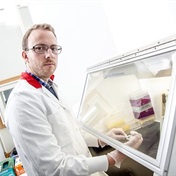Surgeons have transplanted the first-ever vein grown in a lab from a patient's own stem cells into a 10-year-old girl, sparing her the trauma of harvesting veins from her body.
The groundbreaking procedure may offer hope for patients who don't have healthy veins for use in dialysis or heart bypass surgery, said a paper published in the Lancet medical journal.
Synthetic veins are prone to clots and blockages, and recipients of foreign veins need to take immunosuppressive drugs for the rest of their lives to prevent rejection.
How the surgery was done
In this instance, a team of doctors from the University of Gothenburg in Sweden took a nine centimetre (3.5 inch) segment of vein from the groin of a dead human donor and removed all living cells.
They then injected the tissue with stem cells obtained from the bone marrow of the girl, diagnosed with a potentially lethal blockage of the portal vein - a large vessel that carries blood to the liver for detoxification.
Two weeks after this "seeding", the vein was implanted into the patient using a bypass technique, the doctors wrote.
"The young girl in this report was spared the trauma of having veins harvested from the deep neck or leg with the associated risk of lower limb disorders," researchers Martin Birchall and George Hamilton said.
Surgery to restore portal blood flow using donor or artificial veins have had mixed success to date. The research team said the patient had no complications from the operation and normal blood flow was restored immediately.
And because the vein holds her own cells, she does not require immunosuppressive drugs.
Girl now does gymnastics
The girl had to have an additional graft a year after the first, but has remained in good health, is able to take increasingly long walks up to three kilometres (1.8 miles), and takes part in light gymnastics, noted the report.
The new graft method resulted in "strikingly improved quality of life for the patient," the authors said.
Birchall and Hamilton noted that high cost and the long time required to prepare this type of graft meant it was unlikely to take off as a common treatment right away.
While the procedure was promising, they added, one-off tests like this one must be converted into full clinical trials.
(AP, June 2012)
Read more:
Stem cells - hope or hype?




 Publications
Publications
 Partners
Partners














